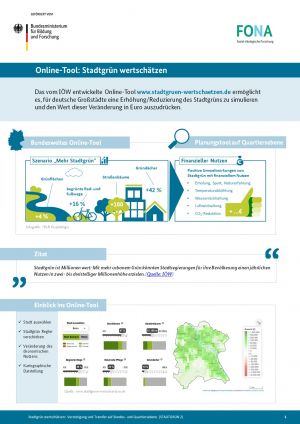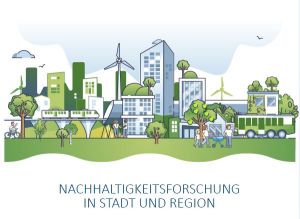Society: Social-ecological research
Under the guiding principle of sustainable development, the Federal Ministry of Education and Research (BMBF) promotes research on significant societal change processes (transformations), such as the mobility transition. The aim is to find applicable solutions for a good and environmentally friendly life. Transdisciplinarity, participation and social innovation characterise sustainability research in cities and regions.
Focus on people
Socio-ecological research is concerned with complex interrelationships between large systems that interact with each other. These affect all areas of human life: for example living and working, mobility, water supply, energy, nutrition, education and recreation. Researchers work in a transdisciplinary manner. This means that research questions are not developed and analysed by science alone, but together with the relevant stakeholders from practice. There are often participation formats in which citizens are also involved. The project teams work interdisciplinarily, as many specialist disciplines contribute their expertise in order to find solutions that then have a systemic effect supporting sustainability. Social and technological innovations go hand in hand, are tested and analysed and the findings are made available to others.
Social-ecological research
- ... is transformative research.
- ... is based on transdisciplinarity.
- ... provides impulses for the science system.
- ... develops application-orientated solutions on site.
- ... tests ideas in real-world laboratories.
- ... utilises participation and social innovation.
- ... focusses on impact and transfer.
Social-ecological research stands for the development of new solutions for more sustainability in our society!
Societal challenges
Our society is facing numerous challenges, for example
- reducing climate-damaging emissions,
- ensuring energy security,
- increasing resilience to crises,
- preserving natural resources,
- maintain the competitiveness of the economy,
- ensure the sustainability of social security systems and
- counteract social inequality.
These partly global challenges must and can be tackled at regional and city level in particular. This is where they become visible and tangible: In cities, they manifest themselves as problems such as health burdens (heat stress, air pollution), rising land prices (due to land scarcity and speculation, among other things), a lack of affordable housing and the desertification of city centres; in rural areas, they are e.g. perceived as difficulties in providing basic services and as threads to natural areas. It is common sense: a societal transformation towards sustainability is necessary. But how can it succeed?
Finding solutions that work: from neighbourhood to region... and beyond
The current funding programmes focus on sustainable development in cities and regions, sustainable mobility, quality of life and resilience of urban areas, the protection of biodiversity and social innovations, for example in construction and housing. Science and practice work together in transdisciplinary research projects. The transfer of research results is of crucial importance. The addressees include decision-makers at municipal level. The BMBF also promotes the exchange between research groups and institutions that are scientifically dedicated to the socially relevant issues of a transformation towards sustainability. They add to the scientific system and promote the methodology development of transformation research.
The projects find solutions that are intended to be applicable and transferable: All spatial levels are addressed, from small urban neighbourhoods to huge urban regions and regional transformation areas (for example metropolitan regions). Socio-ecological research projects are also part of transnational alliances at European level.
Sustainablity research in city and region - topics:
Our funding measures focus on sustainable development in the city and region and address the following topics:
- Sustainable mobility
- Sustainable building and housing
- Sustainable infrastructure, resources and climate adaptation
- Sustainable economy
- Biodiversity conservation and sustainable land use
- Sustainability in science and
- Transdisciplinarity (methods).
They are part of the BMBF transformation initiative "Stadt-Land-Zukunft" with its specific reference to municipal, regional or functional areas.
You can find our current funding measures here.

Sustainable urban development - Example
As an example, we present one of the research projects from socio-ecological research - a successful project: Valuing urban greens!
The Online-Tool www.stadtgruen-wertschaetzen.de developed by the Institute for Ecological Economy Research (IÖW) in the project provides simulations of increase/reduction in urban greens for major German cities and to monetarise the value of this change in Euro.
The full version of the two-pager on "Valuing urban green" project is available here.
From A to Z: Agenda 2030 and "Future Strategy for Research and Innovation"
GAIA articles from the funding pRIORITY
The funding priority Social-Ecological Research regularly reports on ongoing research initiatives, projects and current research issues in the scientific journal GAIA - Ecological perspectives for Science and Society (oekom).
Articles from socio-ecological research in GAIA (Open Access) discussing current research initiatives, projects and research tasks.

Stay informed
Subscribe to our newsletter!
The BMBF's Social-Ecological Research Newsletter is usually published quarterly. Click here to subscribe to the newsletter "Sustainability Research in Cities and Regions"! (available in in German language)
Current news on X: @soef_BMBF
Last updated on










